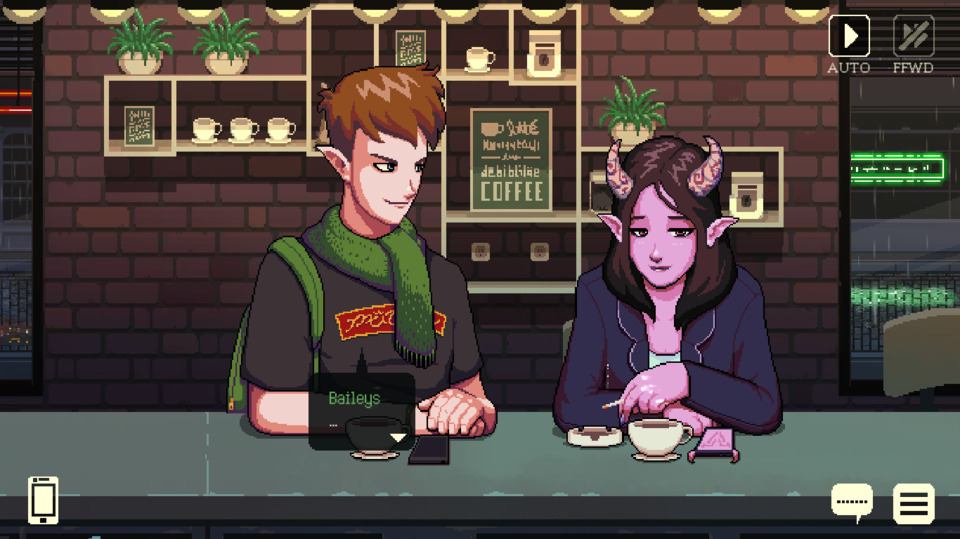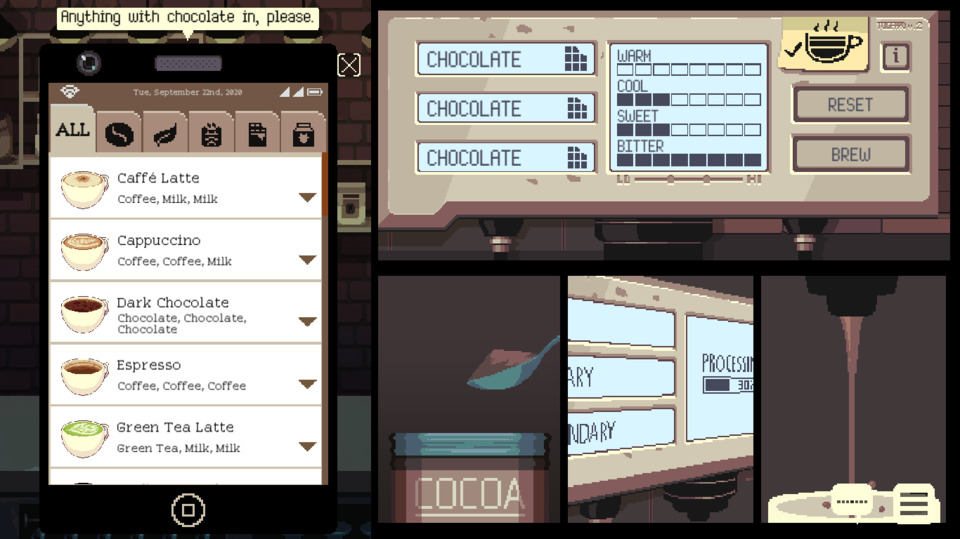Indie Game of the Week 280: Coffee Talk
By Mento 0 Comments

If you were to ask me most days what single video game genre I couldn't live without, I'd probably answer "RPGs." I might be cheating the spirit of the inquiry by referring to RPGs in a general sense - western, eastern, tactical, action - as that versatility and variety are often the genre's greatest strengths. Few genres have escaped a stringent degree of codification the way RPGs have, excepting perhaps one other: adventure games. A familiar refrain on Indie Game of the Week is that the adventure genre has burst from the three or four variants we had in its '90s heyday to what feels like a dozen and counting, and much of that is courtesy of endlessly inventive Indie developers figuring out new ways to tell their stories.
Toge Productions's Coffee Talk belongs to a very specific hybrid format I've only seen one game do before - and I'll get into that in just a moment - which is that of the visual novel simulator. That is to say, a game that both delivers its content in a mostly passive manner much like a visual novel while also having a simulation aspect that gives the player some sort of occasional interaction to keep them focused when the narrative alone is insufficient. In Coffee Talk, you play as the unseen barista and owner of a Seattle coffee shop that has the late opening hours of a bar: the idea being that there are always those in the dead of night looking for a warm drink, a place out of the rain, and pleasant conversation, without necessarily planning to tie one on. The other twist is that this Seattle is much like the version of the Emerald City in the Shadowrun universe, in that it's populated by fantasy races that at some point in the distant past decided to leave their forests and mountains to join a modern civilization in-progress, finding aptitudes in more contemporary pursuits like graphic and game design, car manufacturing, journalism, business management, or the medical profession. (Despite Seattle being a common venue for Shadowrun adventures, including both of its 16-bit video game adaptations, I suspect the choice of setting here had more to do with being the coffee capital of the world than anything else.)

There's no escaping comparisons to that other popular visual novel style game set inside a drinking establishment, VA-11 Hall-A: Cyberpunk Bartender Action. The structures of the two games are strikingly similar: you open the shop, you converse with customers, they'll occasionally interject to order a drink that you then craft with an intuitive UI, and the discussion proceeds as more people filter through like so many coffee granules. You'll start to see familiar faces, are prompted to recall their "usuals," and follow the arc of their lives as they pop back in occasionally with updates and surprises. However, beyond that foundation Coffee Talk does choose to handle a few aspects a little differently. The first and most noticeable for those who have played through the prologues of both is that Coffee Talk is overall much nicer than VA-11 Hall-A, with each of its focal characters being a generally pleasant human being (or an orc, or an elf) that inspires sympathy immediately, rather than those who are initially abrasive or come off as "the rough sort" that can raise your heckles a little and induce a more stressful atmosphere. Depending on your tastes, I can see the merit to either approach: the former makes for a more relaxing time, while the latter's bite improves the verisimilitude of a customer service job and the unpredictability of your subsequent encounters - the next patron to walk in might become your best friend or your worst enemy.
The other approach where the two games differ is in the drink preparation aspect. While VA-11 Hall-A gave you the occasional vague prompt to work through, you have every recipe unlocked from the outset and could intuit their preferences based on the clues provided. With Coffee Talk, you start with very few recipes (despite the protagonist ostensibly knowing every drink in the menu) and must build new drinks by tinkering with the ingredients. Typically, you start with coffee, tea, green tea, chocolate, or milk, and then add either another of the same drink to strengthen it or add flavors by way of mint, cinnamon, honey, or ginger. Each drink has to have three components, including a liquid core (so no dropping three sticks of cinnamon into a mug and calling it a day), and the order of the ingredients added also matters. Most concoctions are named simply, like "tea with ginger," though there's a select few that become specific named beverages with the right order of ingredients, some of which are real and some fictional. A few of the real ones include hot drinks from the developer's home nation of Indonesia: Teh Tarik, Jahe Tubruk, and STMJ are all drinks you can learn to make (the last requires an egg, which the game tosses in for free without adding it to the menu since there's so many drinks you could instantly ruin by pulling a Rocky on it). You're given a hard limit of five do-overs per day, but since you'll rarely need to serve more than a few drinks it's often worth experimenting a little to see what you can come up with: there'll be times when you're required to pluck the correct drink recipe out of thin air, as some customers give you zero hints whatsoever. Most of the time, though, they'll ask for something specific or at the very least a flavor profile made up of certain ratios of warm, cool, sweet, or bitter that turns out to offer more leeway than you might think. The limited do-overs only apply to finished drinks too: you can mess up as many times as you'd like while in the preparation stage, in case you're the clumsy kind.

Either way, Coffee Talk is definitely going for "cozy" over anything else with its vibe, as perhaps can be expected of a game that has "coffee" and "talk" in its title. Given the oddness of the "modern day Middle-earth" setting, there's one relatively normal character in the human woman Freya, a struggling fiction writer by night and journalist by day, who is in the shop practically every evening and will talk candidly with the other customers, sometimes offering her insight on them once they've left. Her arc, as well as those of the others, will change depending on whether or not you serve them the right drinks on the right days. Since the game is broken up into days each of which are about twenty minutes long (or closer to five if you're skipping the text on subsequent runs) it's a relatively quick process to restart and try a different approach if you feel you didn't figure out the right drink to serve; you can just also save the game directly before pouring a drink and playing around with the ingredients until you find something promising.
Aesthetically, Coffee Talk does well to make its characters feel like real people with a set of expressions that helps accurately convey their emotional state, and their idle animations as they answer their smartphones or take a drag on a cigarette are well done in how understated they can be. There's only two backdrops in the game - the interior and the exterior of the titular café - but little graphical flourishes can be found with the game's social network equivalent, as each customer's data gets added to it after meeting them for the first time (and getting their drinks right unlocks more information about them) including their profile pictures. Musically, the game realizes what sort of relaxing, jazzy atmosphere tends to be requisite for a late-night, non-alcoholic drinking establishment, and the player has the option of shuffling through the soundtrack at any moment and selecting whichever BGM they prefer. However, it's all mostly germane mood music, so no single track really sticks out. The UI is entirely functional, with all the accoutrements you'd hope to see in a visual novel-adjacent game: you can skip already read text, you can peruse a "backlog" of previous lines of conversation in case you lost the thread somewhere, and the game never prompts you to hurry up or keep things moving (with one notable exception).

One detriment is that the game is very short for a visual novel: I barely clocked in over five hours, with many of its arcs resolved far too quickly after only a few updates and the overall cast is fairly small at around ten patrons total. Each one has a full arc and revisits the café several times, so there are none of the goofy one-offs that made a certain other game of this type as memorable as it was. On the whole, though, I think Coffee Talk makes another strong case for a visual novel complemented by a quick and simple mini-game that still has enough nuance behind it to create an effective means of controlling the story, either positively with right choices or negatively through incorrect ones (though sometimes the right choice isn't always the one the customer asked for). A certain spectre of tragedy looms over the game at present, given the recent passing away of its main creative lead Mohammad Fahmi, but it sounds like the other developers are still moving ahead on an upcoming sequel due for release in 2023 (I was unsure if it was still being made without its lead, but the game's appearance at this summer's Wholesome Direct suggests so). I wish them all the best, and I'll look forward to trying it out someday.
Rating: 4 out of 5.
| < Back to 279: Eldest Souls | The First 100 | The Second 100 | > Forward to 281: Legends of Amberland |
